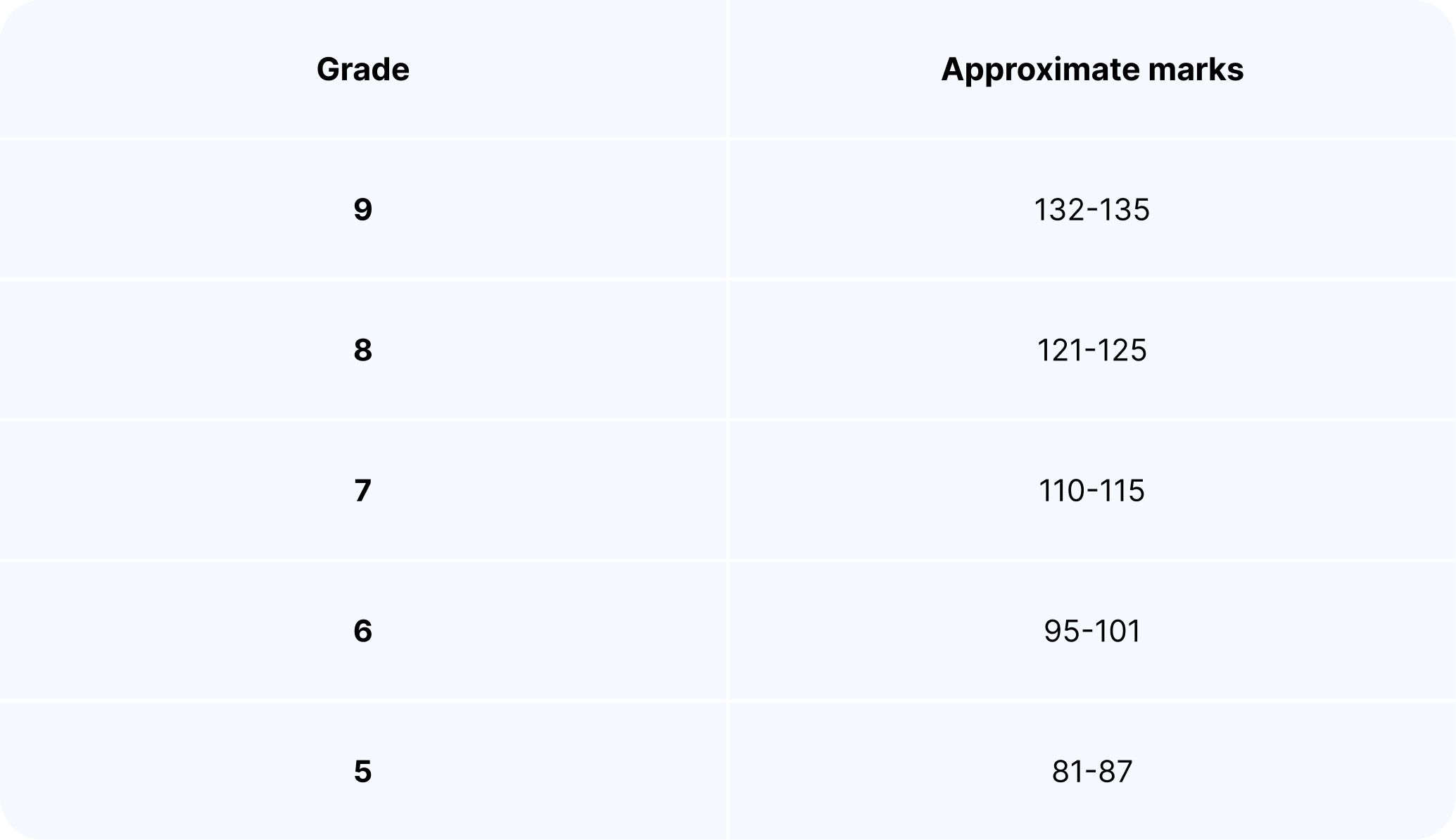Contents
Get ready to ace your Edexcel GCSE English Literature exams! Here’s a breakdown of how the papers are split, what to expect and what grades you might need to hit your target.
Not sure which exam board your school uses? Take a look at our guide to finding out which exam board you’re studying.
Key takeaways:
There are two written papers for Edexcel English Literature GCSE, equally weighted but with more time for Paper 2.
Grade boundaries are set after the exams have happened, but we’ve included analysis of the last few years' grade boundaries to give a sense of what to expect.
You’ll have four set texts to study for the exam, but you won’t be able to bring them into the exam hall on the day.
What’s the format of the Edexcel GCSE English Literature exam?
The Edexcel English Literature exam will look like:
Two closed-text written papers, which means you can’t bring the exam texts into the exam hall with you.
Paper 1 will last 1 hour and 30 minutes, and Paper 2 will last 2 hours and 15 minutes.
Each paper is worth 80 marks.
The total available marks are 160.
The papers each contribute towards 50% of your final grade.
The two papers will test your knowledge on four set texts including one Shakespeare play, one post-1914 novel, one 19th-century novel and a poetry anthology.
Free revision timetable template & more
Less stress, more success! Get your free revision timetable templates and guide to effective revision today. Because great revision starts with a solid plan.
What’s the difference between Papers 1 and 2 for Edexcel English Literature?
Papers 1 and 2 are equally weighted, with the same number of marks available for each. However, you will have 45 minutes longer to complete Paper 2.
Here’s a breakdown of what’s included in each paper:
Paper 1: Shakespeare and post-1914 literature
Section A: You’ll be asked a two-part question on a Shakespeare play. Part A will ask you a question related to an extract, whereas Part B will ask you to show textual knowledge by answering a related question on the rest of the play.
Section B: You’ll be asked to answer a question on a post-1914 British play or novel. There will be one question for this part, and it will be an essay question on the whole text.
Take a look at the Edexcel English Literature Paper 1 from May 2024 to learn more.
Paper 2: 19th-century novel and poetry since 1789
Section A: You’ll be asked a two-part question on a 19th-century novel. The first part will ask you to analyse an extract of the text about a specific theme, and the second part will ask you to relate your knowledge to the whole text.
Section B: Asks you two questions:
The first is to compare a poem from your anthology to an unseen poem. These are grouped by theme.
The second question will ask you to compare two unseen poems on the same theme.
Take a look at the Edexcel English Literature Paper 2 from May 2024 to learn more.
What are examiners looking for?
The questions are asking you to show your knowledge of the texts and wider contexts.
Examiners are looking for a detailed, clear analysis of the texts and a well-structured argument.
You’ll gain marks for supporting your arguments with evidence, such as quotes.
You should be analysing language, structure, and form, and showing your understanding of the wider context of the novel, play or poem.
It’s also important to show you can compare and contrast texts and show your own opinions on them, too.
Find out more about what examiners are looking for by taking a look at previous Edexcel GCSE English Literature mark schemes.
What are the grade boundaries for Edexcel GCSE English Literature?
It’s important to remember that the exact grade boundaries for your GCSE exams will change every year. Exam boards adjust the grade boundaries after an exam has happened, depending on how advanced the exam content was and how the cohort performed.
This is so students don’t have an advantage or disadvantage because of the year they took the paper. For example, if your paper were harder, grade boundaries would be lowered so that a grade 5 reflects the same level of knowledge as in previous years.
To give a sense of what to expect, here’s a summary of the grade boundaries for the last few years for Edexcel English Literature GCSE:

The grade boundaries change year on year, but not by a huge amount. While we can’t accurately say what next year's thresholds will be, the table above should give you an idea of what marks to aim for to hit your target grades.
*Not including 2022, where the total marks available were lower.
What are the core texts for Edexcel English Literature?
The set texts for Edexcel are periodically reviewed, but as of the 2024 specification, they are currently:
Shakespeare
Macbeth
The Tempest
Romeo and Juliet
Much Ado About Nothing
Twelfth Night
The Merchant of Venice
Post 1914 British play or novel
An Inspector Calls by J.B. Priestley
Hobson’s Choice by Harold Brighouse
Blood Brothers by Willy Russell
Journey’s End by R. C. Sherriff
Animal Farm by George Orwell
Lord of the Flies by William Golding
Anita and Me by Meera Syal
The Woman in Black by Susan Hill
The Empress by Tanika Gupta
Refugee Boy by Benjamin Zehniah, adapted for the stage
Coram Boy by Jamila Gavin
Boys Don’t Cry by Malorie Blackman
19th-century novel
Jane Eyre by Charlotte Brontë
Great Expectations by Charles Dickens
Dr Jekyll and Mr Hyde by Robert Louis Stevenson
A Christmas Carol by Charles Dickens
Pride and Prejudice by Jane Austen
Silas Marner by George Eliot
Frankenstein by Mary Shelley
Poetry anthology
The poetry collections are grouped by theme, with each collection containing 15 poems that cover romantic, literary heritage, and contemporary poetry.
The collection themes are: relationships, conflict, time and place, and belonging.
Your school will choose your set texts from each category and teach them in detail throughout Year 10 and 11, preparing you for the exams.
How can I prepare for GCSE English Literature?
Here are 5 top tips for preparing for your GCSE English Literature exams:
1. Know your set texts
The key area that GCSE English Literature tests is your knowledge and understanding of your set texts.
Read and re-read each of your set texts, noting key themes, passages and characters.
Make summary sheets for each of the key themes, characters, context, and quotes.
Learn a selection of short, powerful quotations per text, aiming to cover the key themes that may come up on the exam.
Watch theatre or film adaptations to expand your understanding, but always compare them to the original text.
Top tip: Try teaching others what you know about a text to help build confidence in your understanding.
2. Practise writing little and often
English Literature exam questions are asking you to write clear and comprehensive answers.
Practise writing PEE/PEEL paragraphs (Point, Evidence, Explain, Link) as a clear way to structure your thoughts.
Use past papers and practise writing answers under timed conditions.
Focus on analysing the text, not just retelling the story. Think about how language, structure, and form create meaning.
Get feedback from your teacher to refine your essay writing technique.
Top tip: Use practice papers under timed conditions to get used to planning and writing clear answers.
3. Don’t forget to revise the wider themes and context
Literature doesn’t exist in isolation. All your set texts relate to the time they were written; examiners will want to see your knowledge of wider issues at play.
Identify what each text says about society, morality, gender, power, class, love, conflict, etc.
Link these to the historical and cultural context of the piece, for example, the use of Victorian morals in Jekyll and Hyde.
Create theme maps showing how different characters and events connect to key ideas.
Top tip: Colour code your notes to help organise your thoughts and make them easier to digest.
4. Practise with new poems and extracts
Testing your skills with past papers is a great way to build speed, accuracy and confidence.
For unseen poetry or extracts, practise reading and annotating quickly
Ask yourself: What’s the tone? What’s the main message? How does the writer create mood or tension?
Then write short comparative responses to your set texts.
Top tip: You can find examples of extracts or poems in Edexcel past papers to practise with.
5. Mimic test conditions
Set yourself up for success by practising in exam conditions to get used to working quickly and with full focus.
Try to sit a full paper under timed conditions, without your notes or texts.
Afterwards, mark your own work using the Edexcel marking criteria or swap with a friend and mark each other.
Reflect on the process: How did you manage your time? Did you plan before writing? Did you include enough quotations and analysis?
Top tip: Break down each question into chunks and set yourself enough time to answer each section.
For more revision top tips, check out our blog on GCSE study habits to build.
Getting prepared for your GCSE English Literature exams starts by understanding what the test will look like. Make sure to bookmark this breakdown to refer back to as you revise key topics and practise your exam technique. With plenty of preparation, you’re sure to get the grades you’re after - best of luck!
Don’t miss Atom’s GCSE giveaway!

Six months. Six epic prizes. Six chances to make the GCSE season unforgettable.
We’re launching Atom for GCSE prep in 2026, and to celebrate, over the next six months, we’re giving away thousands of pounds worth of prizes to help your child level up their GCSE revision.
Here’s a taste of what’s up for grabs:
The latest Apple tech, including an iPad Air, Vision Pro and more
Festival tickets for Boardmasters and Reading 2026
Europe interrail passes and £1,000 spending money
…and that’s just a few of the amazing prizes available.
Our first two winners have already taken home incredible prizes! Find out who they are and what they won in our latest giveaway update and keep an eye out for news of our November winner.
It’s free to join. UK only. Full T&Cs apply.
Contents
